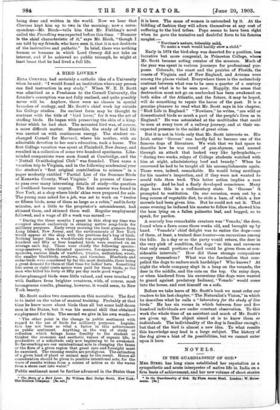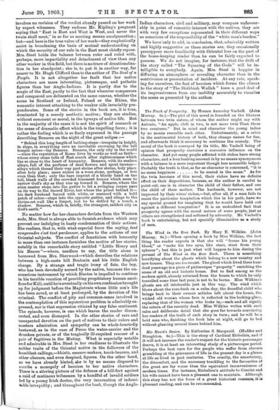NOVELS.
IN THE GUARDIANSHIP OF GOD.* MRS. STEEL has long since established her reputation as a sympathetic and acute interpreter of native life in India 'on a firm basis of achievement, and her new volume of short stories
• The Story of a Bird Lover. By William Earl Dodge Boat. New York: BliarthanshiP of Bed. BY Blocs Annie Steel. London: W. Bei"'
involves no revision of the verdict already passed on her work by expert witnesses. They endorse Mr. Kipling's pregnant saying that "East is East and West is West, and never the twain shall meet," in so far as meeting means amalgamation; but—and here is the true value of her work—they emphatically assist in broadening the basis of mutual understanding on which the security of our rule in the East must chiefly repose. Mrs. Steel holds the balance between ruler and ruled with, perhaps, more impartiality and detachment of view than any
other worker in this field, but there is no trace of denationalisa- tion in her standpoint; she-is, to put it in another way, fax nearer to Mr. Hugh Clifford than to the author of The Soul of a People. It is not altogether her fault that her native characters are more interesting, picturesque, and pathetic figures than her Anglo-Indians. It is partly due to the
magic of the East, partly to the fact that wherever conquerors and conquered are delineated on the same canvas, whether the scene be Scotland or Ireland, Poland or the Rhine, the romantic interest attaching to the weaker side invariably pre-
ponderates. Some of the stories in the book are, it is true, dominated by a merely aesthetic motive; they are studies, without comment or moral, in the byways of native life. But in the majority of the cases it is not the spirit of research or the sense of dramatic effect which is the impelling force ; it is rather the feeling which is so finely expressed in the passage describing Benares on the night of the great eclipse " Behind this long length of bathing-steps—irregular in height, in slope, in everything save an inevitable crowning by the tall temple spires—lay Benares. Benares, the only city in the world —since the reputation of Rome lives by works as well as faith— whose every stone tells of that search after righteousness which lies so close to the heart of humanity. Benares, with its sunless alleys, full of the perfume of dead flowers and spent incense— alleys which thread their way past shrine after shrine, holy place after holy place; mere niches in a worn stone, perhaps, or less even than that; only the bare imprint of a bloody hand on the tall, blank walls of the crowded tenement houses which seem to narrow God's sky as they rise up toward it. Benares, where the alien master steps into the gutter to let a swinging corpse pass on its way to the Sacred River, but where the priest behind it— his dark forehead barred with white, or smeared with a bold patch of ochre—steps into the opposite gutter, and clings to the shrine-set wall like a limpet, lest he be defiled by a touch, a shadow. Benares, which is, briefly, the strangest, saddest city on God's earth."
No matter how far her characters deviate from the Western code, Mrs. Steel is always able to furnish evidence which may prevent our indulging in hasty condemnation of their actions. She realises, that is, with what especial force the saying, tout eamprendre c'est tout pardonner, applies to the actions of our Oriental subjects. The conflict of fanaticism with humanity
in more than one instance furnishes the motive of her stories, notably in the remarkable story entitled "Little Henry and his Bearer "—where, needless to say, the title alone is borrowed from Mrs. Sherwood—which describes the relations between a high-caste hill Brahmin and his little English charge. By a strange and tragic irony of fate, the boy, who has been devotedly nursed by the native, becomes the un- conscious instrument by which BisrAm is impelled to continue in his terrible vocation of providing propitiatory human sacri- fices for Kill, until he is eventually on his own confession brought up for judgment before the Magistrate whose little son's life has been saved, or at least prolonged, by the devotion of the criminal. The conflict of pity and common-sense involved in the contemplation of this mysterious problem is admirably ex- pressed, nor is that expression vitiated by any false sentiment. The episode, however, is one which leaves the reader discon- certed, and even dismayed. In the other stories of rare and unexpected devotion on the part of natives to their rulers and masters admiration and sympathy can be whole-heartedly bestowed, as in the case of Peroo the water-carrier and the drunken private, or of the tragically ill-requited rescuer of a pair of fugitives in the Mutiny. What is especially notable and admirable in Mrs. Steel is her readiness to illustrate the nobler traits of the Oriental native in the followers of the humblest callings,—bhistis, essence-makers, torch-bearers, and other obscure, and even despised, figures. On the other hand, as we have already hinted, she is by no means disposed to ascribe a monopoly of heroism to her native characters.
There is a stirring picture of the defence of a hill-fort against a raid of mutinous tribesmen by a handful of invalid soldiers led by a young Irish doctor, the very incarnation of indomi- table intrepidity; and throughout the book, though the Anglo- Indian characters, civil and military, may compare unfavour- ably in point of romantic interest with the natives, they are with very few exceptions represented in their different ways as conscious of the responsibility of the "white man's burden."
We have-only to add, in conclusion, that, admirably written and highly suggestive as these stories are, they occasionally presuppose more familiarity with Oriental lore on the part of the home-keeping reader than he can be fairly expected to possess. We do not imagine, for instance, that the drift of the story called "The Squaring of the Gods" will be in- telligible to everybody. Again, Mrs. Steel is happier in diffusing an atmosphere or revealing character than in the contrivance or presentation of incident. At any rate, speak- ing for ourselves, the feat of heroism which forms the climax to the story of "The Shalibi.sh Wallah" loses a good deal of its impressiveness from our inability accurately to visualise the scene as presented by the author.











































 Previous page
Previous page